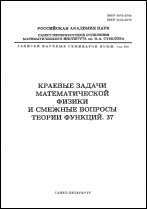|
|
Zapiski Nauchnykh Seminarov POMI, 2001, Volume 276, Pages 253–275
(Mi znsl1420)
|
 |
|
 |
This article is cited in 18 scientific papers (total in 18 papers)
Problems of extremal decomposition of the Riemann sphere
G. V. Kuz'mina
St. Petersburg Department of V. A. Steklov Institute of Mathematics, Russian Academy of Sciences
Abstract:
We apply a variant of the method of the extremal metric to some problems concerning extremal decompositions and related problems. Let $\mathbf a=\{a_1,\dots,a_n\}$ be a system of distinct points on $\overline{\mathbb C}$ and let $\mathscr D(\mathbf a)$ be the family of all systems $\mathbb D=\{D_1,\dots,D_n\}$ of nonoverlapping simply connected domains on $\overline{\mathbb C}$ such that $a_k\in D_k, k=1,\dots,n$. Let
$$
J(a)=\max\limits_{\mathbb D\subset\mathscr D(\mathbf a)}\biggl\{2\pi\sum_{k=1}^nM(D_k,a_k)-\frac2{n-1}\sum_{1\le k<l\le n}\log|a_k-a_l|\biggr\},
$$
where $M(D_k,a_k)$ is the reduced module of the domain $D_k$ with respect to the point $a_k$. At present, the problem concerning the value $\max\limits_{\mathbf a}J(a)$ was solved completely for $n=2,3,4$. In this work, we continue the previous author's investigations and consider the case $n=5$. In addition, we consider the problem concerning the maximum of the sum
$$
\alpha^2\bigl\{M(D_0,0)+M(D_{n+1},\infty)\bigr\}+\sum_{k=1}^nM(D_k,a_k)
$$
in the family $\mathscr D(\mathbf a)$ introduced above, where $\mathbf a=\{0,a_1,\dots,a_n,\infty\}$, $a_k$, $k=1,\dots,n$, are arbitrary points of the circle $|z|=1$, and $\alpha$ is a positive number. We prove that if $\alpha/n\le1/\sqrt8$, then the maximum is attained $\alpha$ only for systems of equidistant points of the circle $|z|=1$. For $\alpha/n=1/\sqrt8$, this result was obtained earlier by Dubinin who applied the method of symmetrization. It is shown that if $n\ge2$, where $\alpha/n\ge1/2$ is an even number, then equidistant points of the circle $|z|=1$ do not realize the indicated maximum.
Received: 15.03.2001
Citation:
G. V. Kuz'mina, “Problems of extremal decomposition of the Riemann sphere”, Analytical theory of numbers and theory of functions. Part 17, Zap. Nauchn. Sem. POMI, 276, POMI, St. Petersburg, 2001, 253–275; J. Math. Sci. (N. Y.), 118:1 (2003), 4880–4894
Linking options:
https://www.mathnet.ru/eng/znsl1420 https://www.mathnet.ru/eng/znsl/v276/p253
|

| Statistics & downloads: |
| Abstract page: | 381 | | Full-text PDF : | 98 |
|




 Contact us:
Contact us: Terms of Use
Terms of Use
 Registration to the website
Registration to the website Logotypes
Logotypes








 Citation in format
Citation in format 
